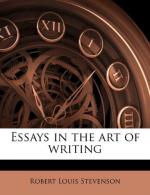’The violence of revolutions is generally proportioned to the degree of the maladministration which has produced them. It is therefore not strange that the government of Scotland, having been during many years greatly more corrupt than the government of England, should have fallen with a far heavier ruin. The movement against the last king of the house of Stuart was in England conservative, in Scotland destructive. The English complained not of the law, but of the violation of the law.’
This was plain-sailing enough; it was our old friend PVF, floated by the liquids in a body; but as I read on, and turned the page, and still found PVF with his attendant liquids, I confess my mind misgave me utterly. This could be no trick of Macaulay’s; it must be the nature of the English tongue. In a kind of despair, I turned half-way through the volume; and coming upon his lordship dealing with General Cannon, and fresh from Claverhouse and Killiecrankie, here, with elucidative spelling, was my reward:
’Meanwhile the disorders of Kannon’s Kamp went on inKreasing. He Kalled a Kouncil of war to Konsider what Kourse it would be advisable to taKe. But as soon as the Kouncil had met, a preliminary Kuestion was raised. The army was almost eKsKlusively a Highland army. The recent vKktory had been won eKsKlusively by Highland warriors. Great chieFs who had brought siKs or SeVen hundred Fighting men into the Field did not think it Fair that they should be outVoted by gentlemen From Ireland, and From the Low Kountries, who bore indeed King James’s Kommission, and were Kalled Kolonels and Kaptains, but who were Kolonels without regiments and Kaptains without Kompanies.’
A moment of FV in all this world of K’s! It was not the English language, then, that was an instrument of one string, but Macaulay that was an incomparable dauber.
It was probably from this barbaric love of repeating the same sound, rather than from any design of clearness, that he acquired his irritating habit of repeating words; I say the one rather than the other, because such a trick of the ear is deeper-seated and more original in man than any logical consideration. Few writers, indeed, are probably conscious of the length to which they push this melody of letters. One, writing very diligently, and only concerned about the meaning of his words and the rhythm of his phrases, was struck into amazement by the eager triumph with which he cancelled one expression to substitute another. Neither changed the sense; both being mono-syllables, neither could affect the scansion; and it was only by looking back on what he had already written that the mystery was solved: the second word contained an open A, and for nearly half a page he had been riding that vowel to the death.




